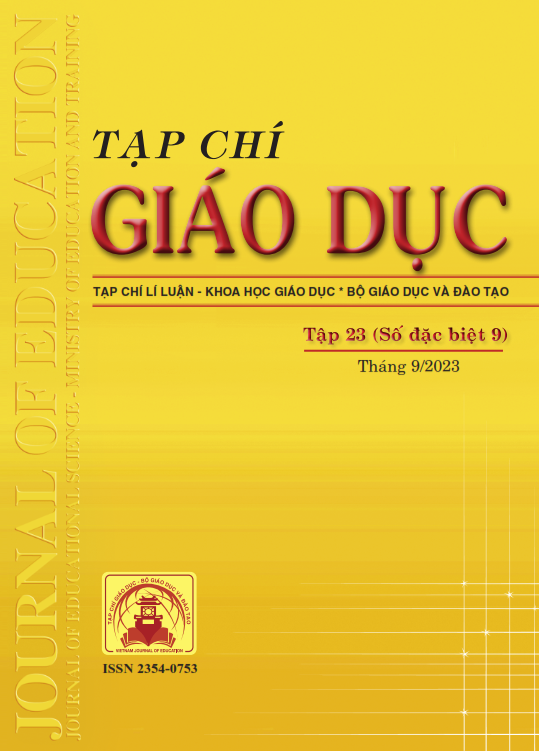Phân tích chất lượng chương trình đào tạo của các cơ sở giáo dục đại học Việt Nam từ kết quả kiểm định chất lượng
Tóm tắt
Accreditation in Vietnamese higher education has been officially implemented for 20 years with obligatory regulation for all institutions and programs. This study focuses on investigating the quality of programs offered by higher education institutions in Vietnam from accreditation results. The research analyzed data of program accreditation results published on the websites of the Ministry of Education and Training and accrediting centers. The results reveal that until the end of May 2023, 802 programs were accredited with the national standards. Among 50 criteria, there are 28 criteria with average scores from 4.00 to 4.33 and 22 criteria with average scores below 4.00. The four criteria with the highest average scores are the criteria of psychological, social and landscape environment; Learners have easy access to the complaint process about learning results; there are academic consulting activities, extracurricular activities, emulation activities and support services; and graduate employment rates are established, monitored and benchmarked to improve quality. Three criteria receiving the lowest average scores are the clarity in the contribution of each course to achieve the learning outcomes; the diversity, validity and reliability of the methods measuring the learning outcomes; and the comprehensive and up-to-date information of the course specification. This shows that accredited programs were only evaluated well in the indirect criteria related to training. In contrast, they received low scores on core criteria directly related to course outlines, learning outcomes and methods of assessing learning outcomes.
Tài liệu tham khảo
AUN-QA (2023). Educational challenges for Vietnamese higher education: Lessons learned from AUN-QA programme assessment.
AUN (2015). Guide to AUN-QA assessment at programme level (version 3.0).
Bộ GD-ĐT (2016). Thông tư số 04/2016/TT-BGDĐT ngày 14/3/2016 ban hành Quy định về tiêu chuẩn đánh giá chất lượng chương trình đào tạo các trình độ của giáo dục đại học.
Bộ GD-ĐT (2023a). Danh sách các cơ sở giáo dục đại học; các trường cao đẳng, trung cấp sư phạm đã hoàn thành báo cáo tự đánh giá, được kiểm định (cập nhật đến ngày 31/5/2023). https://moet.gov.vn/tintuc/Pages/tin-tong-hop.aspx?ItemID=7910
Bộ GD-ĐT (2023b). Danh sách các chương trình đào tạo được đánh giá/công nhận (cập nhật đến ngày 31/5/2023). https://moet.gov.vn/tintuc/Pages/tin-tong-hop.aspx?ItemID=8592
EAHEA (n.d.). Accreditation benefits. https://www.eahea.org/accreditation/accreditation-benefits.html
Hegji, A. (2017). An overview of accreditation of higher education in the United States. Congressional Research Service.
Johnston, M. P. (2014). Secondary data analysis: A method of which the time has come. Qualitative and Quantitative Methods in Libraries, 3(3), 619-626.
Kumar, P., Shukla, B., & Passey, D. (2020). Impact of accreditation on quality and excellence of higher education institutions. Investigacion Operacional, 41(2), 151-167.
Nguyen, C. H., Evers, C., & Marshall, S. (2017). Accreditation of Viet Nam’s higher education: Achievements and challenges after a dozen years of development. Quality Assurance in Education, 25(4), 475-488. https://doi.org/10.1108/QAE-11-2016-0075
Nguyen, C. H., Ta, T. T. H., & Nguyen, T. T. H. (2017). Achievements and lessons learned from Vietnam’s higher education quality assurance system after a decade of establishment. International Journal of Higher Education, 6(2), 153-161. https://doi.org/10.5430/ijhe.v6n2p153
Nguyen, C. H., & Ta, T. T. H. (2018). Exploring impact of accreditation on higher education in developing countries: A Vietnamese view. Tertiary Education and Management, 24(2), 154-167. https://doi.org/10.1080/13583883.2017.1406001
Nguyễn Hữu Cương, Trần Ngọc Hạnh, Trần Lê Phương Thảo, Bùi Thị Thùy Trinh, Hà Vĩnh Phước, Trần Hồng Nhựt Minh (2022). Chất lượng các chương trình đào tạo giáo viên trình độ đại học ở Việt Nam nhìn từ kết quả kiểm định chất lượng [Bài trình bày]. Hội thảo khoa học quốc gia “Đào tạo giáo viên trong bối cảnh đổi mới chương trình và sách giáo khoa: Chính sách và thực tiễn”, Trường Đại học Đồng Tháp, Cao Lãnh, Đồng Tháp.
Nguyen, K. D., Oliver, D. E., & Priddy, L. E. (2009). Criteria for accreditation in Vietnam’s higher education: Focus on input or outcome? Quality in Higher Education, 15(2), 123-134. https://doi.org/10.1080/13538320902995766
Pham, H. T. (2018). Impacts of higher education quality accreditation: A case study in Vietnam. Quality in Higher Education, 24(2), 168-185. https://doi.org/10.1080/13538322.2018.1491787
Qualtrics (n.d.). Secondary research: Definition, methods, & examples. https://www.qualtrics.com/au/experience-management/research/secondary-research/
Đã Xuất bản
Cách trích dẫn
Số
Chuyên mục
Giấy phép

Tác phẩm này được cấp phép theo Ghi nhận tác giả của Creative Commons Giấy phép quốc tế 4.0 .












